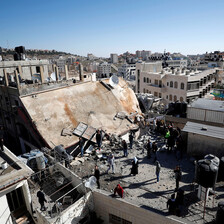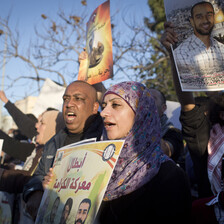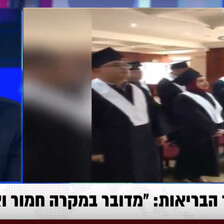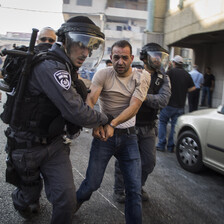The Electronic Intifada Jerusalem 19 October 2011
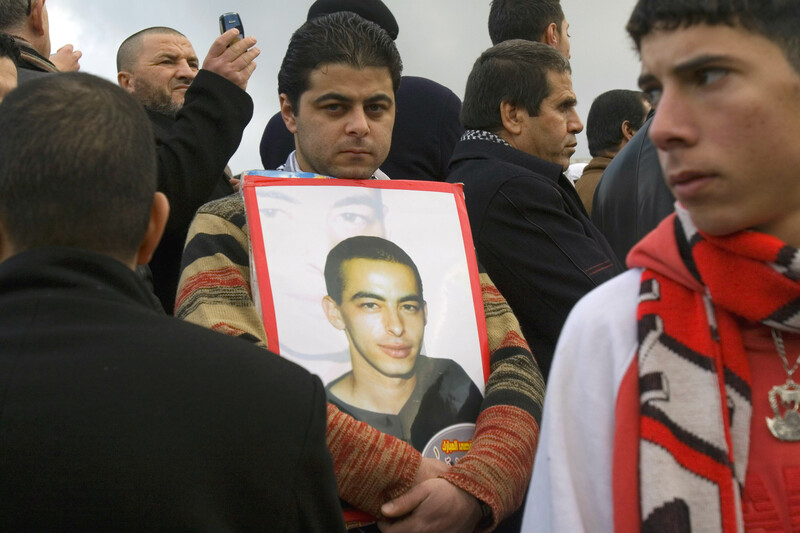
Marching annually in Sakhnin, families continue to demand accountability for the deaths of 13 Palestinians by Israeli police forces in October 2000.
ActiveStillsOn 1 October, thousands of Palestinians marched in Sakhnin to commemorate the eleventh anniversary of the October 2000 uprising during which Israeli police forces murdered 13 unarmed Palestinian citizens of Israel over the course of eight days. None of the slain protesters posed a threat to the life of police forces or others and most of them were shot in the upper-body at close range. The killings took place in Umm al-Fahm, Jatt, Arrabeh, Sakhnin, Nazareth, Kufr Kanna and Kufr Manda between 1-8 October 2000.
“Eleven years later, the wound is still bleeding,” Ibrahim Siyam, father of martyr Ahmad Siyam and spokesman for the martyrs’ families, told The Electronic Intifada. “Ahmad was the first martyr of the October 2000 demonstrations. He was just 18 and preparing to attend college in few days,” Siyam added.
All 13 martyrs were young men, brimming with hope and life. Amid the attempts of the Israeli propaganda machine to dehumanize Palestinians, the martyrs’ families insist on reminding everyone of the dreams and aspirations of their loved ones.
One of the most poignant images of the October 2000 uprising was that of 17-year-old Aseel Assleh from Arrabeh wearing a T-shirt that carried the logo of Seeds of Peace — a Palestinian-Jewish peace group — his head buried in an olive grove after being shot in the back of his neck at extremely close range. Aseel was a remarkably smart student who believed in non-violent resistance and whose political consciousness far exceeded his age.
In a phone interview, Aseel’s father, Hassan Assleh, said, “Aseel crackled with energy … even on his way to the demonstration in Arrabeh on 2 October, he was singing. His eyes were glistening with hope and lust for life.”
Challenging the “death-loving” myth
Hassan Assleh is particularly bothered by the stigma often ascribed to Palestinians in the mainstream Israeli and Western media as “death-loving people” who are obsessed with seeking martyrdom. “This is a simplistic and false stereotype,” he said. “Aseel had smoldering passion and he clung to life until his very last heartbeat. All Palestinians are like that. Don’t think that any of the martyrs chooses to die or put martyrdom as their goal. We are aware, however, that freedom requires great sacrifices and it is the insistent drive to freedom and justice that inspires these young women and men to sacrifice. Martyrdom is not our aim, but it’s the cost we are forced to pay to liberate our land and regain dignity.”
When I asked him whether he regrets allowing his son to join the demonstration, he heaved a deep sigh that summed up his feelings as expressively as his eloquent words. “No, even if I had known the consequences, I would have never stopped him from joining the protest. I always taught my kids to speak out and stand up to injustice; and preventing Aseel from attending the demonstration would have contravened the values his mother Jamila and I hold,” he replied.
“However, there are arduous times when I feel betrayed by our political ‘leadership’ that did very little to demand accountability. In these painfully onerous and lonely moments, I miss Aseel the most. His memory and my wife’s fortitude keep me strong, though.”
“Betrayed by the political leadership” is a feeling that is constantly expressed by the martyrs’ families. Even though it was the High Follow-Up Committee for Arab Citizens in Israel that called for mass demonstrations and public strikes on 1 October 2000 in response to Ariel Sharon’s rabble-rousing visit to the Al Aqsa mosque in Jerusalem, and the killing of 12-year-old Mohammad Al Durra a day later in Gaza, the martyrs’ parents feel that the High Follow-Up Committee and the Palestinian parties in the Knesset (Israeli parliament) have let them down ever since.
“I think that since the establishment of the Or Commission [the commission that was set up by the government to investigate into the killings under pressure from the Palestinian minority], the High Follow-Up Committee and all the Palestinian parties did not apply any pressure,” Ibrahim Siyam said. “The Commission desperately tried to absolve the government from any responsibility and in various occasions it denied Palestinians due process and failed to abide by legal norms, but this might not have not happened had a constant pressure been exercised.”
Siyam agrees with Assleh: “With every passing year, the October 2000 uprising is pushed further to the margins. In this year, the High Follow-Up Committee did not call for a public strike and was content with staging a central march that has over the years become more of a festival.”
The victims’ families are concerned that the October 2000 uprising is turning into a folklore event that is only remembered every subsequent year on 1 October.
Protection from amnesia
“It’s important to internationalize the October 2000 massacre,” Assleh said, “But what’s more important is to protect it from amnesia inside Palestine. Just like the Kufr Qassem massacre and Land Day, October 2000 is a landmark in the struggle of Palestinian minority in Israel against the Zionist entity and every Palestinian citizen of Israel should be aware of its significance and implications.”
Keeping October 2000 a part of the local discourse is an enormous challenge, however. And while the Palestinian political representatives inside Israel bear some of the brunt, the state of Israel also attempts to control the collective memory of Palestinians by banning schools from commemorating the October 2000 killings and persecuting and terrorizing those who do. For instance, the principal of Al Battof high school in Arrabeh was summoned for a hearing at the Israeli ministry of education for holding a panel to discuss the October 2000 killings. Such steps, along with the “Nakba Law” and the censorship imposed on teaching the Palestinian narrative, make a mockery of Israel’s claim to be the “only democracy in the Middle East.”
Another damning indictment against Israel is the fact that no criminal investigation was held into the October 2000 killings, and that none of the policemen responsible for the killings was held accountable. In its final report that was published in September 2003, the Or Commission, headed by Justice Theodore Or, found that rubber-coated bullets and live ammunition were used against unarmed protesters and ordered the police investigation department Mahash to restart investigation into the cases. Two years later, Mahash concluded that there was no sufficient evidence to warrant criminal investigation into the cases, in stark contrast to the findings of the Or Commission. In his review of Mahash’s report, the then Attorney General Menachem Mazuz decided to back Mahash and closed all 13 cases in February 2008.
“We never trusted the racist state of Israel to bring us justice.” Assleh said. And he is right. In the country that boastfully appoints itself as the only democracy in the Middle East, state-sponsored crimes against Palestinians have always gone unpunished.
Ibrahim Siyam wondered: “If one Jewish citizen had been killed by the police, do you think they would have allowed the killer to escape accountability? In Israel, it seems that Palestinian lives are cheap.”
Budour Youssef Hassan, originally from Nazareth, is a Palestinian socialist activist and third-year law student at the Hebrew University in Jerusalem. Follow her on Twitter at: twitter.com/Budouroddick.
